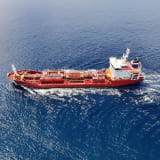Posts
25/03/24
Japan Update: Powering Tomorrow’s Ships – Embracing Nuclear Propulsion for a Greener Future

Last week in Tokyo, Core Power, a British offshore nuclear energy provider, announced progress on a pioneering project involving a small nuclear power plant designed for offshore floating systems. This venture, led by CEO Michal Bøe, aims to develop a molten salt fast reactor (MCFR) in collaboration with Terra Power from the United States, Southern Company, a US-based electric power company and HD Hyundai Group, South Korea’s largest shipbuilder. The joint venture is slated for establishment by 2025, with Core Power aiming to secure US$ 400 million in funding between 2025 and 2026.
Emphasizing adherence to international rules, CEO Bøe highlighted the safety aspects of the MCFR, distinguishing it from conventional pressurized water reactors (PWRs) plagued by safety concerns. Bøe assured that the non-pressurized MCFR, containing fuel within the furnace, minimizes risks, even in rare accident scenarios.
While Core Power focuses on sales aspects of the MCFR project, Japanese shipbuilders and ship-owners are already expressing interest. Seventeen Japanese companies, including Onomichi Shipbuilding and Imabari Shipbuilding, have invested in Core Power. Moreover, Core Power is exploring a marine molten salt reactor for ship propulsion, a development capturing the attention of Japanese investors for its potential in power generation.
The shipping industry confronts mounting pressure to slash carbon emissions, fueling efforts to transition from diesel to lower-carbon alternatives like LNG, methanol, ammonia, or hybrid propulsion. While adoption is on the rise, these substitutes are viewed as interim transitional solutions, igniting interest in nuclear power as a strong contender towards achieving complete decarbonization. The IMO’s ambitious target of achieving net-zero emissions by 2050, coupled with the EU’s introduction of carbon emission charges, provides even greater motivation for embracing this movement.
Nuclear advocates have long argued that nuclear-powered vessels offer unparalleled advantages, operating for extended periods without refueling, boasting smaller fuel tanks and avoiding competition with shore energy resources. Companies like Vard Group, Fincantieri, and Newcleo have also been actively exploring nuclear propulsion, including Generation IV reactors, SMRs, and advanced technologies like thorium-fueled molten-salt reactors and lead-cooled fast reactors.
Despite promising advancements, doubts among commercial shipping players and regulatory challenges remain hurdles. Skepticism arises due to unfamiliarity with this technology and how to handle it, leading to resistance. Reactor safety, public perception, and port regulations do necessitate very careful management. However, once these are under control, the potential benefits of nuclear propulsion, including substantial emissions reduction and meeting decarbonization targets, far outweigh the challenges. Through ongoing R&D endeavors to address safety apprehensions and continuous industry education, nuclear propulsion has the potential to become the primary solution for sustainable shipping in the future.
To the maritime shipbuilders and ship-owners in Japan, embracing nuclear power as a fuel source for commercial ships holds immense promise. The Core Power project and broader industry developments signal a shift towards sustainable practices, aligning with Japan’s commitment to environmental stewardship. Just like the timeless spirit of Japan, we believe that progress may seem slow at first, but once unity is forged, momentum swiftly propels us forward. By investing in nuclear propulsion technologies, Japanese stakeholders can lead the charge towards a cleaner, greener future for the maritime industry and leave a lasting legacy for generations to come.
By Eugene Quek, Partner and Head of Projects in Japan.
Articles
You may also be
interested in
View allGet in touch
Contact us today to find out how our expert team can support your business













